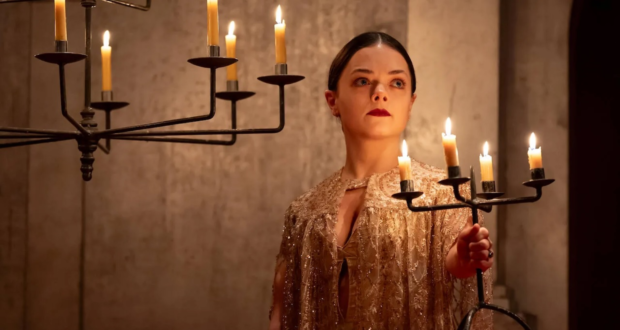A superb cast in a drama showing how little toxic misogyny has diminished in over 400 years.Summary
Rating
Excellent
John Webster’s play from 1613 was the opening production in the Sam Wanamaker Playhouse at Shakespeare’s Globe just over a decade ago, and it is perfectly suited to the theatre’s small, candlelight intimacy. Rachel Bagshaw directs this revival with, as you can expect from the Globe, a particularly strong cast. Newly widowed, the Duchess (Francesca Mills) is forbidden to remarry by her brothers Ferdinand (Oliver Johnstone) and the Cardinal (Jamie Ballard). With the aid of her waiting woman Cariola (Shazia Nicholls) she secretly marries her lowly steward Antonio (Olivier Huband) while Bosola (Arthur Hughes) spies for her brothers.
Mills, fresh from success as Hermia in the Globe’s A Midsummer Night’s Dream, dazzles as the Duchess. The high-brow noblewoman morphs through the throes of giddy young love and then to defiance and resolve. Johnstone also excels as Ferdinand. Initially he is nothing but loving and devoted to his sister but her defiance of his wishes regarding marriage, before secretly marrying a lowly steward, unleashes a storm of blood and betrayal.
Lighting (via candle consultant Sally Ferguson) really adds to this production. Key scenes of the play take place in darkness, extinguishing candles to leave us sat with just enough light to make out the characters, but not enough to make out the grisly severed limbs, thus allowing our imaginations to run wild. Of course any theatre can turn out the lights but with the candlelit Wanamaker, it feels closer, more intimate and darker.
Bagshaw injects a lot of humour into the early scenes of the play, notably around the Duchess’s seduction of Antonio: she adjusts her dress and crosses herself before he arrives in her chambers, the lightness and optimism of their relationship soon to come to a violent end. Written over 400 years ago, Webster’s themes of defying societal expectations and pointing to misogyny have never felt so relevant. It says a lot about the world we live in now that this production can include a ‘joke’ about spiked drinks made by the current Home Secretary without its intent feeling out of place. When men are sent to torture and abuse the Duchess, the bile they spew could be pulled from the replies and messages that women routinely receive across social media.
Every performance of The Duchess of Malfi features creative captioning, where the text is projected on the backstage, and it has been included as a part of the creative process from the start. This allows for the captioning to take a more active part in the story, with illustrations supporting the text and words fading away and overlapping. It is exceptionally well executed and thought out, with the text matching the colour of characters’ outfits and their side of the stage.
This is a strong production with a talented cast showing, sadly, how some stories never age and how little some things change over the centuries.
Written by: John Webster
Directed by: Rachel Bagshaw
Candle consultancy by: Sally Ferguson
Caption Design by: Sarah Readman
The Duchess ofMalfi plays at the Sam Wanamaker Playhouse until 14 April. Further information and tickets can be found here.
 Everything Theatre Reviews, interviews and news for theatre lovers, London and beyond
Everything Theatre Reviews, interviews and news for theatre lovers, London and beyond



